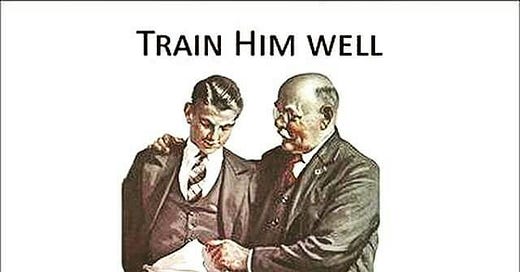Crafting the Future One Apprentice at a Time
A Deep Dive into the First Part of "IV of Masters, Wardens, Fellows, and Apprentices" and Its Profound Implications for Mentorship and Leadership in Freemasonry
Candidates may, nevertheless, know that no master should take an apprentice unless he has sufficient employment for him;
and unless he be a perfect youth, having no maim or defect in his body that may render him incapable of learning the art, of serving his master’s lord, and of being made a Brother, and then a Fellow-craft in due time, after he has served such term of years as the custom of the country directs; and that he should be descended of honest parents;
that so, when otherwise qualified, he may arrive to the honour of being the Warden, and then the Master of the Lodge, the Grand Warden, and at length the Grand Master of all the Lodges, according to his merit.
This verse is a blueprint for the future of Freemasonry. It outlines the criteria for apprenticeship and, by extension, the qualities that should define us as Freemasons.
It's not just about who gets in; it's about who we become.
Ignoring this principle is like setting sail without a compass. You might drift along for a while, but eventually, you'll find yourself lost at sea. The integrity of the Craft is at stake when we compromise on the quality of our apprentices and, by extension, our future leaders.
The verse is rich in its language and layered in its meaning. The term "apprentice" comes from the Latin "apprehendere," meaning "to grasp" or "to learn." The word "master," derived from the Latin "magister," signifies a person who has control or authority.
The verse is essentially saying that a master should only take an apprentice if he can truly offer him meaningful work and if the apprentice is physically and morally fit for the role.
The principle here is one of responsible mentorship and selective apprenticeship. The key lesson is that an apprentice should be "a perfect youth, having no maim or defect" and "descended of honest parents." This isn't just about physical capability; it's about moral integrity and the potential for growth within the Fraternity.
So, how do we apply this in our daily lives?
First, as mentors, whether in our Lodges or in our professional lives, we must ensure that we have the resources and wisdom to guide those who look up to us. We should not take on responsibilities we cannot fulfil.
Second, as individuals seeking growth, we should strive to be "perfect" not in the sense of being without flaws, but in the sense of being fully committed to our own improvement and to the betterment of our community; but remember striving for perfection is a journey not a destination.
Lastly, the verse reminds us that we should be "descended of honest parents." While we can't choose our parents, we can choose to live honestly, thereby becoming the "honest parents" of future generations.
By adhering to these principles, we not only enrich our own lives but also contribute to the strength and integrity of the Fraternity. And in doing so, we ensure that the honour of leadership within the Fraternity is earned, not given, and based on merit, not circumstance.




